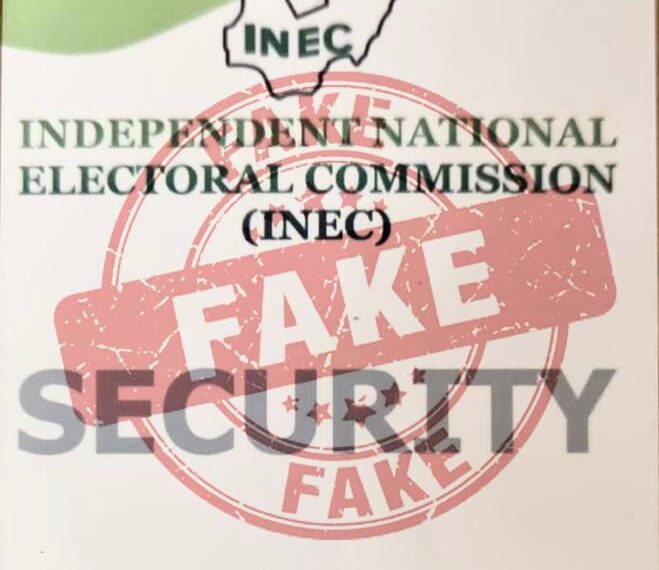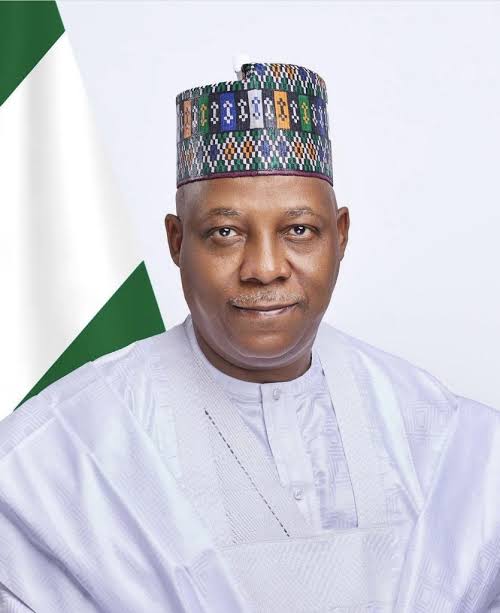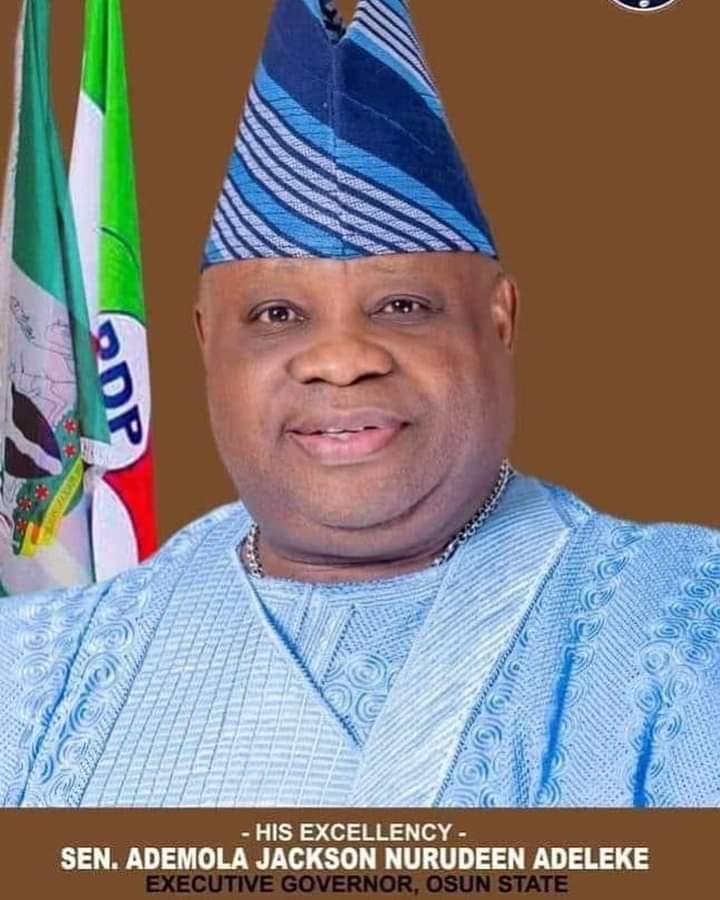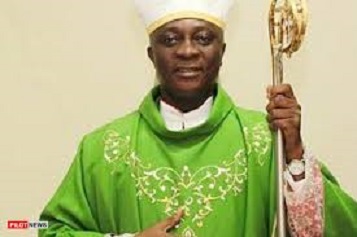NEWS
#NigeriaDecides: We Don’t Issue Security Tags, INEC Alerts Public

The commission, INEC, has raised awareness among the general public about the presence of counterfeit security identity tags that bear the commission’s name and logo.
For the initial phase of the elections held two weeks ago, which included the presidential and National Assembly elections, INEC distributed distinct identity tags to accredited journalists, observers, and security personnel who were overseeing the polls.
It also provided a different tag for access to the National Collation Centres.
The governorship elections today (Saturday) will be held in 28 states, while the state houses of assembly elections will be held in all 36 states.
The postponed Enugu East Senatorial Election and the Esan Central/Esan West/Igueben House of Representatives seats in Edo State will also be held today.
The Commission would announce another date for the conduct of supplementary elections arising from the 25 February Presidential and National Assembly election, it said.
But hours before the commencement of the governorship and state houses of assembly elections, the commission said its attention had been drawn to a fake security tag with the inscription “Complete Access” printed on the tag in red ink.
In a statement by the commission’s spokesperson, Festus Okoye, INEC said the tag did not emanate from it.
It called on Nigerians to report anyone found with such a tag, saying anyone bearing the said tag is on illegal duty and is liable to arrest and prosecution.
“We wish to state categorically that the identity card did not emanate from the Commission. Identity cards for security personnel on election duty were issued by the security agencies and not the Commission,” he said.
“Anyone bearing an identity card allegedly issued by the Commission for security personnel can only be on illegal duty. Such a person is liable to arrest and prosecution.
“The public is alerted to this diabolical action of some misdirected elements and to report any such persons to the security agencies.”
NEWS
Christmas: Shettima Assures Of FG’s Commitment To Citizens’ Welfare

Nigeria’s Vice President, Kashim Shettima has assured Nigerians of the federal government’s dedication to national security, economic transformation, and welfare of the citizens.
This was detailed in a Christmas message on Wednesday afternoon in Abuja under the signature of the Senior Special Assistant to The President on Media & Communications (Office of The Vice President), Stanley Nkwocha.
According to the Vice President, the administration of President Bola Ahmed Tinubu remains unwavering in its focus on these critical areas, as the country looks forward to the dawn of a new year.
ALSO READ: Tinubu Sends Hearty Christmas Greetings To Christians Worldwide
He said, “In these times of economic transformation, I want to assure you that the President Bola Ahmed Tinubu administration remains steadfast in its commitment to improving the lives of all Nigerians.”
Vice President Shettima particularly urged the citizens to imbibe the virtues of national unity during the yuletide season.
“Nigeria’s diversity remains our greatest strength. Let us avail ourselves of the time provided by the holiday season to strengthen the bonds of brotherhood that unite us across all faiths and regions,” he said.
Senator Shettima assured Nigerians of the continued vigilance of the nation’s security forces, noting that “our brave security personnel will continue to work round the clock during this festive period to keep us safe.”
He said enhanced security measures have been put in place to protect the citizens during the holiday period.
“The relevant agencies have been mobilized to ensure your safety and comfort on all major routes,” he stated, urging travelers to remain vigilant.
VP Shettima expressed optimism about the nation’s trajectory in the coming year, saying, “I am filled with hope and optimism about Nigeria’s future. Together, we will build a more prosperous and united nation.
“To our young people, you are the backbone of our nation. The Renewed Hope administration is implementing various initiatives to create opportunities for you to thrive and contribute to Nigeria’s development,” he added.
NEWS
Yuletide: Adeleke Rejoices With Christians

Osun State Governor, Senator Ademola Adeleke has felicitated Christians in Osun State and beyond on the occasion of the 2024 Christmas celebration, urging them to follow Jesus Christ’s example of compassion and tolerance.
Biztellers reports that Gov Adeleke described the birth of Jesus Christ as a defining moment for mankind, in a statement in Osogbo on Tuesday.
He described the festive season as a solemn reminder of the power of love and how it can save humanity.
ALSO READ: Archbishop Martins Champions Clamour For Better Life For Nigerians
While recognising unity and togetherness as an important message that Jesus Christ’s life resonates, Gov Adeleke charged Osun people, particularly Christians, to draw from the spiritual import of the celebration by sharing love and fostering harmony in communities.
In his words, “I extend my warm wishes to Christian faithful in Osun state and beyond as we mark this year’s Christmas. The birth of Jesus Christ is a manifestation of the power of love and remind us of the essence of compassion,” the Governor noted in his message.
“In the mood of celebration, I urge us to take a moment to reflect on the message of renewal that the birth of Jesus Christ signifies, promoting activities that will unite not divide, build not destroy, and bring peace not conflict.
“It is also my sincere appeal that we extend hands of kindness to the needy and the weak in the society, spreading love and generosity beyond borders. That is the essence of Christmas and it is most essential that at a time like this, no one is left to their fate.”
NEWS
Archbishop Martins Champions Clamour For Better Life For Nigerians

Archbishop Alfred Adewale Martins, of the Catholic Archdiocese of Lagos, has enjoined all Nigerian leaders to be more sensitive to the yearnings of the people for a better life.
This was contained in a 2024 Christmas Message to Nigerians issued in Lagos under the signature of the Director of Social Communications, Very Rev. Fr. Anthony Godonu.
According to the Archbishop there is an urgent need for a better enabling environment to allow businesses thrive in a bid to reduce the high rate of unemployment and the grinding poverty in the land.
He urged leaders to prioritise the welfare of citizens over personal needs in addressing the widespread hunger, poverty, joblessness, and insecurity ravaging the nation.
ALSO READ: Tinubu Sends Hearty Christmas Greetings To Christians Worldwide
In his words, “Even in the face of policies that are deemed to have positive results in the long-term, such as the removal of fuel subsidies, floating of the naira and the new tax reforms initiative, governments must ensure that the immediate welfare of people is not neglected but factored into the planning and execution of such policies. This is necessary, if the people for whom the policies are being made are not to die before the positive results begin to manifest.
“At the same time, government spending must be prudent and compassionate. In addition, it is necessary to pay more attention to the agricultural sector so that food security can be ensured for overall benefit.”
The Prelate described as very sad and depressing the recent loss of several lives of innocent Nigerians in Ibadan, Abuja, and Anambra in their quest to access food palliatives owing to pervading hunger across the country.
He considered it worrisome that many Nigerians now find it difficult to purchase necessities of life, especially during this festive season that should be a period of merriment, sharing of love, food, and other essentials, which are the hallmarks of the Christmas season.
To forestall a reoccurrence of such ugly incidents, the prelate urged governments, at both federal and state levels, as well as the legislative assemblies, to identify and quickly fix the loopholes in the polity that are responsible for the massive poverty and hardship which Nigerians are facing.
He advocated the appraisal of the nation’s existing laws and enactment and enforcement of only proactive policies that would open the business environment, attract investors, and create more jobs so that the citizens can afford their basic needs; rather than depend on palliatives that offer only temporary relief.
The prelate urged substantial investments in the agricultural sector of the economy to ensure the availability of basic foodstuffs; thereby reducing the high cost of essential food items like rice, beans, onions and grains.
“If citizens have food in their homes, people will not endanger their lives while scrambling for palliatives in the way it happened,” he noted with sadness.
While praying for the souls of those who died in the recent stampedes in parts of the country, he also commiserated with those who lost their loved ones, praying that Jesus, the Prince of Peace would bring solace to the afflicted, comfort to the grieving, and hope to the despairing.
“This special season reminds us of the profound love of God, who sent His only Son to redeem humanity. May the light of Christ illuminate our lives, dispel darkness, and fill our hearts with love, compassion, and kindness. As we gather with family and friends, let us not forget those who are less fortunate, the vulnerable and the marginalised. May our celebration be a catalyst for acts of charity, generosity, and solidarity,” he stated.















